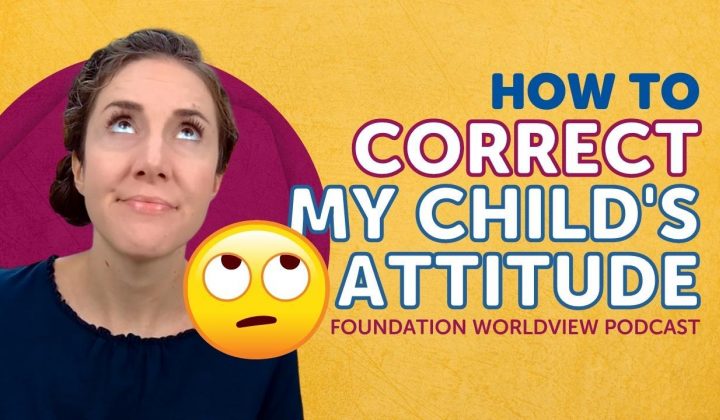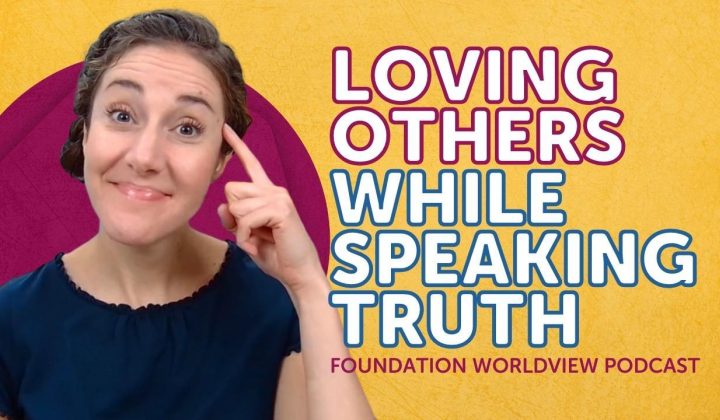Learn more about the journey that led to us equipping kids to carefully evaluate every idea they encounter.
Meet members of our team who have contributed to curriculum development.
Hear from real users of the Foundation Curriculum.
Learn what we believe about God, Jesus, Scripture, and more.
When Kids Ask "Are You A Christian?" - Guiding Your Child’s Bold Faith in Social Settings
In this episode, we tackle a great question from a parent whose six-year-old son frequently asks new friends and strangers if they are Christian. While this is a well-meaning habit, it can sometimes make others uncomfortable. Host Elizabeth Urbanowicz shares how to affirm a child’s love for Jesus while also offering guidance on how to engage with others in a way that opens up meaningful conversations without causing discomfort. Tune in for practical tips on nurturing your child’s faith while teaching them relational wisdom.
Transcript
Note: The following is an auto-transcript of the podcast recording.
Hello, friends. Today's podcast question says, "my six-year-old son consistently asks friends, new friends and strangers if they are a Christian. How would you address this well-meaning habit, that can be uncomfortable for some to answer. PS. thanks for your content in equipping. We are currently halfway through the Biblical Worldview curriculum." Well, I'm so happy to hear that, and I'm also grateful for this question because I think a lot of times children who love Jesus and want to share him with others just have very natural questions about if others are Christians and why others don't love Jesus. And we know that in social situations this can be uncomfortable. That those can be uncomfortable questions for others to answer. So we're going to look at how can we guide our children well in how they interact with others and share their passion for Jesus?
So that's what we're going to cover today on the Foundation Worldview Podcast where we seek to answer your questions so that you can equip the children that God has placed in your care to carefully evaluate every idea they encounter and understand the truth of the biblical worldview. I'm Elizabeth Urbanowicz, your host, and I'm thrilled that you've joined me for this episode today.
Now, in response to this particular questioner with a 6-year-old son, my first statement would be, praise God for a son who loves Jesus and is friendly in interacting with others. Those are really great things. So my first recommendation to anyone in this situation would be affirm your child, affirm their love for Jesus, that you are so grateful that they have a heart that loves Jesus and that wants others to know him. Just affirm that. Then affirm their love for others. Affirm how they interact with others, how they ask others questions, how they're bold in their interactions. These are really great things that we want to affirm in our children. And then my second recommendation would be to use this as a direct training opportunity. I think sometimes in modern parenting and even modern Christian parenting, parents are a little bit intimidated to correct their children for fear that somehow if they offer correction, that they're going to ruin their children for life. Where this is just not true. That God disciplines those he loves, he corrects us. So I'm not saying that this is a situation that would involve discipline, but it is a situation that would involve correction. And if we are truly seeking to disciple our children and we are truly loving them as Jesus loves them, we're going to correct them both in times when they sin against others and in times when they are doing things that are unwise. And this is the time to do this, especially at the age of six because once are adults, parents can choose to speak into children's lives. But really, once children are adults, parents no longer have that same authority in their lives. And similarly, when kids get into the teenage years, parents still have authority over their lives. However, that authority is starting to look a little bit different in the relationship where when your children are under the age of 13, you still have this authority in their life where you are directing and correcting and training them. That starts to shift a little bit in the teenage years as children gain more independence as they're moving towards adulthood. So I would say use this as a direct training opportunity, that this is the time and the season to offer that direction and correction.
And so I would recommend to this questioner and to anyone dealing with a similar situation, to just be very direct and say, you know what? I am so grateful that you love Jesus and that you love other people and that you're wondering who are other people who know and love Jesus? But you know what? Sometimes when you go up to others and you ask them if they are a Christian, that might make them feel a little bit uncomfortable. So you know what? We're going to think through, what are some other questions that you can ask people that would help it so that they're not really uncomfortable when you ask them a question? And so then just think through good questions. They can ask others. You can suggest some. You can have your child come up with some. For example, good questions that you can ask others are, how many people are in your family? Or what are your favorite things to do? Or do you have a favorite food? If you're wanting to talk a little bit more about Christianity, you could ask, does your family go to church? Have you ever read the Bible? So asking a question like, "do you go to church" or "have you ever read the Bible?" Those are a little bit less direct and abrasive than "Are you a Christian?" So we can have our child practice asking these questions. This is something that you can do at dinnertime. You can brainstorm questions that your child could ask, and you can also just start asking one another questions at dinnertime. You can start writing out some questions, putting them in a bowl and have everybody pick out one question at a time to ask others. Because we want to train our children to develop positive relationships. And this is something that actually needs direct training, especially in the world in which we live, where we just naturally, because of the way our world is so individualistic and there's so many screens involved, we just have fewer interactions with others than in the past. And many times those interactions that we do have with others, especially children to children, are awkward because are so used to interacting with screens rather than people. So highly recommend, capitalize on dinnertime conversations in training your child to ask good questions and just think through those questions that you can ask others. And this will make it so that it's more natural when they're in a social setting that rather than just going to, are you a Christian, they can think of other questions that they can ask.
Then once you've nailed down some questions your child can ask in those situations, you can talk through ways that your child can share their love for Jesus without asking that very abrasive question that might make people feel uncomfortable. Now, it's not wrong to always ask someone, are you a Christian? There are times where you might interact with somebody and think, I wonder if they're Christian. And after you've interacted say, Hey, are you a Christian? It's not a bad question, it's just if your child is running up to people, strangers, and that's the first thing they say is, are you a Christian? That's a little bit direct? Similar to other questions, there can be other questions that would be abrasive. You don't want to walk up to somebody that you've just met and be like, Hey, have you ever tried a diet? Okay, that's a very insulting question to ask them. And so there's just certain questions that we want to save for different times in conversations. So you can talk through what are some ways that your child can share his or her love for Jesus without asking such an abrasive question. For example, you can say, you know what? We're reading through the book of First Samuel right now. So when you're talking with someone, you can say, Hey, my family is reading a book of the Bible together. Have you ever read the Bible? That's a little bit less of an abrasive question. Or you can ask your child what their favorite Bible verse is and say, okay, that's your favorite Bible verse. So you can share that. You can share that with someone. Say, Hey, my favorite Bible verse is, and then share what your favorite Bible verse is. And then you can ask them, do you have a favorite verse? Or you can talk with your child about how they really enjoy going to corporate worship on Sundays, how they enjoy going to church, and so they can share with someone, I really like going to church on Sundays. Does your family go to church? And so just different questions, things that they can share from their own life, and then a question they can ask.
Now, the person who wrote in this question said that they're halfway through our Biblical Worldview curriculum here at Foundation Worldview. So if you've gone through part or most or all of that curriculum, that should provide you and your child with a great framework for things that they can talk about, that your child can talk about things that he or she has learned in that curriculum. They can say, Hey, I learned the other day that truth is what is real. That's a great thing that they can share. Or they can talk about how they learned that feelings are different than truths, and then they could maybe share that truth and feeling game that we play in the curriculum and can play it with others. Or if you're thinking of unit three, when we're talking about life and creation, you can talk about how have your child share? Do you know that all life contains information? Or you can talk through how information always comes about on purpose, and then things with a purpose. Have a creator. These are exciting things that your child is learning and then can share with others. That these are exciting things that can start conversations that are not as direct and abrasive as just asking, are you a Christian? For those of you who have taken your children through our Attributes of God curriculum, that can be another great talking point with your child and friends or new friends or even strangers - Attributes of God that they're learning. Things like, maybe they can talk about, I learned last week that God is immutable. That means God never changes. Isn't that amazing? Okay, so these are just some great talking points that your child can go through in conversation. So that would be my recommendation for anyone who has a child that tends to ask more direct questions that might cause some discomfort with others.
First, affirm your child. Affirm their love for Jesus and their love for others. Use this as a direct training opportunity. Talk through what are some good questions they could ask others that are a little bit less abrasive than are you a Christian? And then talk through ways that they can share their passion for Jesus through sharing things that they love and then asking that person a question. And all of these things are just really helpful as we are training our children to love God and love others because we don't want them to hide their light under a bushel. That's something that we're told not to do in Scripture. While at the same time, part of loving others means learning to be relationally wise and learning to read others to understand what they're thinking or feeling to ask good questions, have good conversation starters. So I'm so excited for the person who wrote in this question, and for anyone else who has a child in a similar situation where they're passionate about Jesus and they sometimes ask uncomfortable questions. You can affirm their love for God, their love for others, and then use this as a training opportunity to teach them how to love others.
Well, that's a wrap for this episode. But if you have a question that you would like for me to answer on a future Foundation Worldview podcast, you can submit that question by going to FoundationWorldview.com/podcast. Also ask that you would just take the few seconds that it takes to rate and review this content that really helps us out at Foundation Worldview. And as we leave our time together, my prayer for you is the same as always, that no matter the situation in which you and the children God has placed in your care find yourselves, that you would trust that God is working all things together for your good. By using all things to conform you more into the image of His Son. I'll see you next time.
Related Posts and insights

Biblical Hospitality Tips for Introverts & Perfectionists
In this episode, Elizabeth Urbanowicz share tips for introverted people who struggle with opening their home to biblical hospitality. We also address how to get over needing everything to be perfect when having people over to your home.

How to Correct My Child's Attitude
Do your children get annoyed when you bring up the things of God? In this week's episode, Elizabeth Urbanowicz talks about how we can appropriately engage and correct our children's attitudes without feeling overbearing.

Loving Others While Speaking Truth: Tips for Christian Parents
How do we train our kids to speak truth in love, without making someone feel bad? It's a question that many parents struggle with. Elizabeth Urbanowicz provides some helpful tips and strategies.





